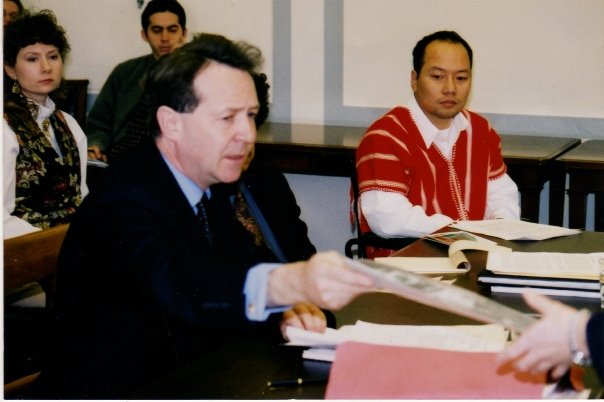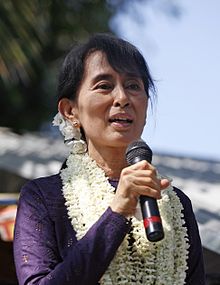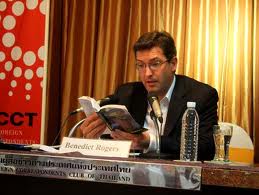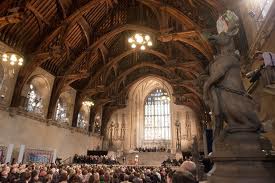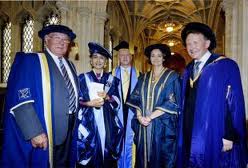Immediately after Aung San Suu Kyi’s historic address to both Houses of Parliament in Westminster Hall on 21 June, a small ceremony took place in Speaker’s House.
Clad in full academic regalia, several of us from Liverpool John Moores University, including our former Chancellor Cherie Booth, greeted Burma’s democracy leader and Nobel Laureate, and presented her with an Honorary Fellowship. First awarded in absentia, in 2009, while Aung San Suu Kyi was under house arrest, it was originally received by her sister-in-law, Lucinda Phillips.
We’ve come a long way since Lucinda’s brother, the Worth-educated Catholic academic, Dr.Michael Arris, was refused permission, when dying of cancer, to travel to Burma to be reunited with his wife. With the former Commons Speaker, Jack Weatherill, I visited the Burmese Ambassador and made a plea that, on compassionate grounds, Dr.Arris be allowed to travel to Burma. Their refusal to grant this request told me all I needed to know about this regime.
After receiving her Liverpool Fellowship Aung San Suu Kyi told me she had many happy memories of visiting Worth Abbey with Michael. On giving her a card from James Mawdsley, the young Catholic who spent 18 months in prison in Burma, after demonstrating against the military regime, she said she had read James’ book, The Heart Must Break, while she was herself under house arrest. James is now in seminary preparing for ordination.
Aung San Suu Kyi is an immensely courageous champion of democracy, human rights and human dignity. The honours she received, ranging from our small ceremony to the presentation of an honorary doctorate at Oxford University, addresses to the London School of Economics and the Sorbonne, and speeches to Parliament, the Nobel Peace Prize Committee and the International Labour Organisation, not to mention sharing a stage with Bono in Dublin, turned the woman we have long admired as a hero of conscience into a global stateswoman.
During the three illegal crossings I have made into Burma’s Karen State and during my visits to Burmese refugee camps I would not have believed that Aung San Suu Kyi would one day be free to address both houses of the British Parliament.
Less than a year ago, such scenes would have been inconceivable.
That she felt sufficiently confident to travel abroad for the first time in 24 years is a sign of how far Burma has come since Daw Suu, as she is affectionately known, first met Burma’s new President, Thein Sein, last August.
Thein Sein has unveiled a reform programme which has, so far, resulted in the release of several hundred political prisoners, including the most high-profile dissidents, a relaxation of media censorship, more space for civil society activity and ceasefire agreements with many of the armed ethnic resistance organisations. Most significantly, Daw Suu and her party, the National League for Democracy (NLD) won 43 out of 45 parliamentary seats contested in by-elections in April, giving them a foothold in the legislature for the first time.
It is important, however, to remember that despite these glimmers of hope, there is still a very, very long way to go. We must avoid the temptation to get caught up in the euphoria of Daw Suu’s visit, and conclude that the job is done. Far from it. As she herself says, while there is room for cautious optimism, much more is required if a peaceful and democratic future for Burma is to be secured.
The changes so far primarily represent a change in atmosphere and, perhaps, in attitude by the regime, which is still dominated by the military even if they are dressed in civilian clothes. There is not yet a change in system. A quarter of the seats in parliament are reserved for the military, and the overwhelming remainder of the seats are held by military-backed parties which won the heavily rigged sham elections in 2010. The NLD has no more than six per cent of the seats.
For there to be real change, there must be serious constitutional reform, gradually reducing the military’s grip on political power. Repressive laws must be amended or repealed. Ceasefires with the ethnic nationalities must be turned into a serious peace process, with a political dialogue that leads to a lasting political solution to decades of civil war. Several hundred political prisoners who remain in jail must be released.
The question of Burma’s ethnic nationalities is fundamental to the country’s future.
Despite some ceasefire agreements with other groups, the Burma Army is continuing a brutal war against the predominantly Christian Kachin people in the north. Thousands have been displaced, villages burned, churches destroyed, women raped and civilians killed.
Further to the west, in Arakan State, state-sponsored sectarian violence between the Buddhist Rakhine and the Muslim Rohingyas has resulted in countless deaths, the destruction of many villages and the displacement of at least 90,000 people. Those who have lost their homes are living without water, food, medicine or shelter.
A grave humanitarian crisis is unfolding, out of sight of the international community because international media, human rights monitors and aid agencies have been denied access to the affected areas.
On Burma’s eastern border, more
than a million people have been driven from their homes and over 3,700 villages have been destroyed since 1996. At least 140,000 refugees live in camps in Thailand. During my visits to the Karen people in these areas I have heard first-hand their stories of horrific abuse.
In recent years, the international community has cut funding for refugees and internally displaced peoples. Food and other rations have been cut below subsistence levels causing great stress and threatening to undermine health and community structures.
Burma’s refugees along its borders have developed many skills in exile and can play an important part in the reconstruction of their country. Now is the time to invest in their lives and ensure that basic humanitarian needs are met so that they can return in good health and with safety and dignity when the time comes.
If we are to truly honour Aung San Suu Kyi, we should respond to her appeal for practical help. That includes expertise in democratisation, the rule of law, and funding for health and education inside Burma. It must include an urgent humanitarian response to the emergency in Arakan State, pressure on the regime to stop the persecution of the Rohingyas and recognise their citizenship which has so long been denied, and investment in serious inter-racial and inter-religious dialogue and reconciliation. It must involve a serious effort to end the war on the Kachin people, and encourage a serious peace process with all ethnic nationalities. And we must heed her appeal for help for refugees on the Thai-Burmese border.
Before visiting Europe, she visited the border, and in her Nobel Peace Prize lecture she said: “I met dedicated people who were striving daily to make the lives of the inmates as free from hardship as possible. They spoke of their concern over ‘donor fatigue,’ which could also translate as ‘compassion fatigue.’ ‘Donor fatigue’ expresses itself precisely in the reduction of funding. ‘Compassion fatigue’ expresses itself less obviously in the reduction of concern. One is the consequence of the other. Can we afford to indulge in compassion fatigue? Is the cost of meeting the needs of refugees greater than the cost that would be consequent on turning an indifferent, if not a blind, eye on their suffering? I appeal to donors the world over to fulfil the needs of these people who are in search, often it must seem to them a vain search, of refuge.”
All who were present enjoyed the celebration of one of our generation’s greatest heroes, who ranks alongside Nelson Mandela, Martin Luther King, Mother Teresa, John Paul II and Mahatma Gandhi. Now, however, we must return to the long, hard, sober work she has given us to do. Aung San Suu Kyi needs our prayers and our practical support more than ever.
——————————————————————————————————————————————
Aung San Suu Kyi’s extraordinary and historic visit to Europe stirred the hearts and minds of many, and put her country, Burma, firmly on the map.
Yet the scenes of her addressing distinguished gatherings in Parliament, Oxford University, the Sorbonne and the Nobel Peace Prize Committee, and meeting royalty, presidents and prime ministers were in stark contrast with the many years in which the suffering of the people of Burma was ignored or unknown by all but a few individuals who worked hard to keep the flame alive.
It is 24 years since Aung San Suu Kyi left her family in Oxford to nurse her dying mother in Rangoon, and found herself leading a new movement for democracy in Burma which resulted in her spending most of the following two decades under house arrest.
During those two decades, she became the face of Burma’s struggle for freedom, but while her face became known, the suffering of her people was largely forgotten. Thousands of her supporters were jailed, subjected to horrific torture at the hands of one of the world’s most brutal regimes. At the same time, the military escalated offensives against civilians in Burma’s ethnic areas, using rape as a weapon of war, forced labour, the forcible recruitment of child soldiers, the use of human minesweepers and the destruction of villages. Religious minorities, particularly Christians among the Kachin, Chin, Karen and Karenni peoples, and the Muslim Rohingyas, have been subjected to severe persecution. Much of this suffering still continues.
On a few occasions, such as when Buddhist monks took to the streets in 2007 and when Cyclone Nargis wrought death and destruction the following year, Burma briefly hit the headlines – and then disappeared again. Over the years, a few international figures have tried to draw attention to the cause. Archbishop Desmond Tutu and former Czech President Vaclav Havel commissioned a report which led to Burma being raised at the UN Security Council. British politicians such as my colleague Baroness Cox, the Speaker of the House of Commons, John Bercow, and the International Development Secretary Andrew Mitchell, visited Burma’s borders, as I myself have done, and these visits played their part in raising the issue.
Lady Cox and I have both relentlessly raised Burma in debates in the House of Lords. Little by little, all these steps helped keep Burma on the agenda, but it was as a result of the efforts of a relatively small group of people who stood steadfast even when the cause seemed hopeless.
Three individuals stand out as people who have contributed significantly to this cause, and as examples of what one person can do if they hold true to their principles, motivated by faith.
James Mawdsley, a young Catholic now in seminary, was arrested in Burma three times for staging one-man demonstrations for human rights and democracy. He came to me in 1998 to tell me of his plans, and to ask for my support. The first time he went, he was deported from Burma swiftly, but he returned, determined to challenge the regime. He particularly wanted to look them in the eye and ask them why they treat the Burmese people so brutally, and he wanted to see Burma’s prison conditions for himself. He knew the only way he could do either was as a prisoner. After his second arrest, James was sentenced to five years in prison, and released after 99 days. He returned the following year, and was given a 17-year sentence.. He was severely beaten and tortured in jail and spent more than a year in solitary confinement before his release.
Benedict Rogers, who works for the human rights organisation Christian Solidarity Worldwide, has campaigned tirelessly for Burma for more than twelve years. He has travelled to Burma and all its borders more than 40 times, and risked his life crossing the borders into the conflict-ridden jungles of Burma’s ethnic states many times. Deported by the authorities from Rangoon twice, he is the author of three books on Burma, which are essential reading for anyone who wishes to understand the country.
His first book, A Land Without Evil: Stopping the Genocide of Burma’s Karen People (Monarch, 2004), is a powerful account of the military regime’s brutal suppression of one of the largest ethnic nationalities, involving crimes against humanity and war crimes.
His second book, Than Shwe: Unmasking Burma’s Tyrant (Silkworm, 2010), puts the spotlight on the dictator who ruled Burma for most of the past twenty years, and unveils his cruel reign of terror.
This month, Rogers has published a new book, Burma: A Nation at the Crossroads (Random House, 2012), which tells the story of Burma’s struggle for freedom, past, present and future. Beginning at Burma’s independence in 1948, the book weaves together the story of the struggle for democracy against military dictatorship, with an account of the plight of Burma’s ethnic nationalities along all of its borders.
With chapters on political prisoners, the 2007 uprising led by Buddhist monks, Cyclone Nargis, the 2010 elections and the current reforms, Rogers has produced a book that is unique in providing a comprehensive and yet accessible analysis of Aung San Suu Kyi’s country. As he said at the launch of the book, in Parliament a week before Aung San Suu Kyi’s address in Westminster Hall, in order to help Burma, it is essential that we understand its past, monitor the present and prepare for the future. No other book fulfils this purpose better than Burma: A Nation at the Crossroads.
The third person who stands out is a young Catholic from Newcastle, Declan Stokle. His family took him to the Thai-Burmese border when he was just eight years old, and he has never looked back. He has spoken in churches, youth groups and schools, and in 2010 when Pope Benedict XVI visited Britain, Declan addressed the Hyde Park vigil. In front of a crowd of 80,000 people, he said: “I am asking you to fight the Burmese junta, not with guns and bullets, but with prayers and actions. I am asking you to fight against this injustice and to be the voice for the voiceless … For me, being a Catholic means standing up for those suffering an injustice – whether on my doorstep or 6000 miles away.”
This theme is echoed by the Archbishop of Rangoon, Charles Bo, who called on the Church in Burma to work for Burma’s freedom, based on justice and reconciliation. Speaking of the ethnic conflict in the country, he said: “There will be peace only when there is reconciliation, and development will be achieved only when there is true and genuine peace.” True freedom, he added, “is to be able to do what is right, honest, sincere, and pure, and not to do simply what one wants to do.”
In an interview during her European tour, Aung San Suu Kyi referred to Blessed John Henry Newman’s hymn, “Lead Kindly Light”. Brave people in Burma, and a few individuals outside Burma, have trod the narrow rugged path in the struggle for freedom and in support of her, in the years of darkness. Now, as Burma begins its fragile, tentative emergence into the light, our prayers, solidarity and practical support are needed more than ever. In the words of that beautiful hymn, “Lead thou me on!”

